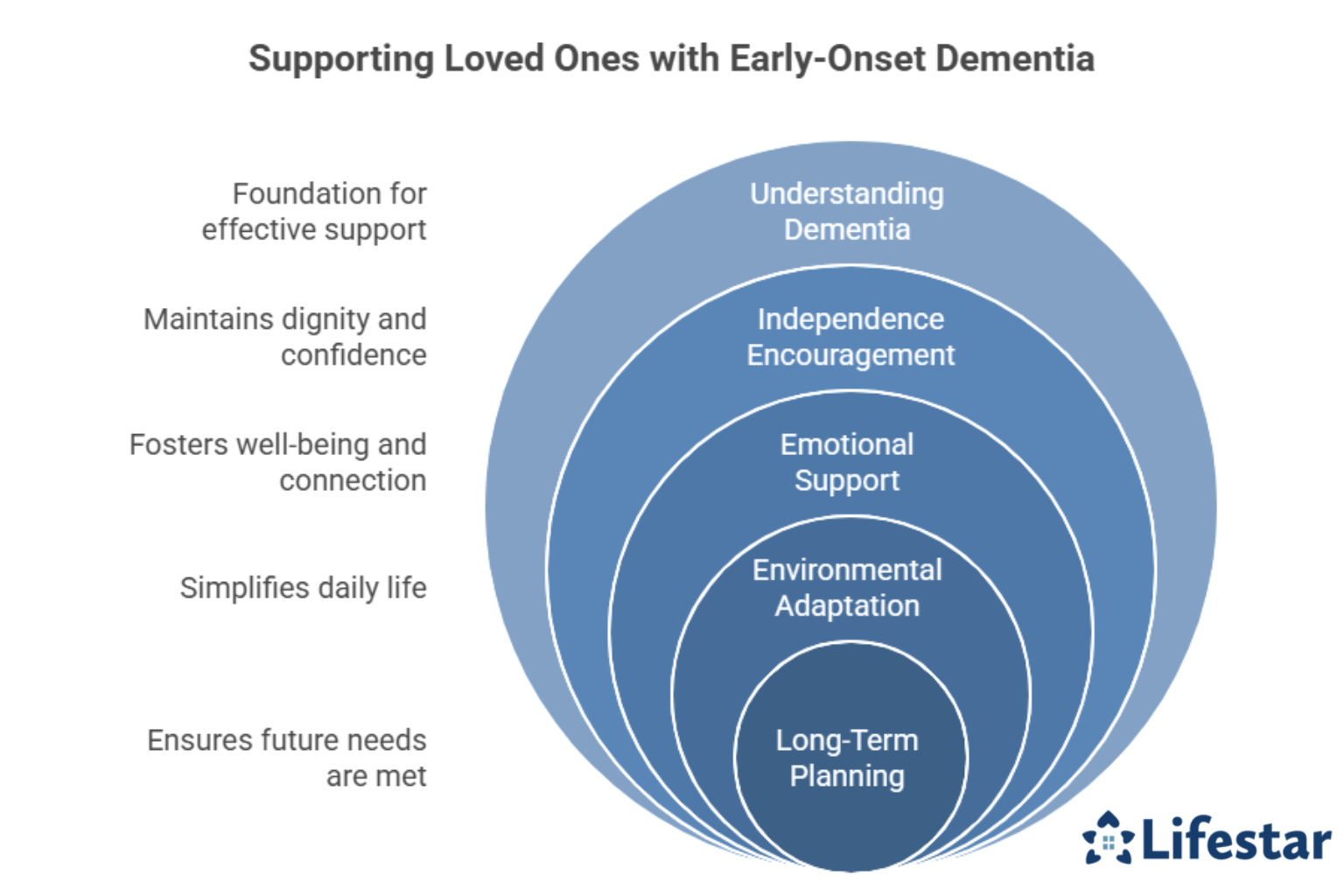
Table of Content
Early-onset dementia is a condition that occurs in individuals under the age of 65, often leaving both the person diagnosed and his or her loved ones feeling unprepared. While the challenges may feel overwhelming, there are ways to offer meaningful support that empowers the person with dementia while navigating this difficult time. Below, we’ll explore actionable steps and strategies to provide practical and emotional care for someone with early-onset dementia.
Build an Understanding of Early-Onset Dementia
Educating yourself about early-onset dementia is a crucial first step in providing effective support. Learn about the symptoms, progression, and unique challenges faced by younger individuals with dementia. Symptoms can range from forgetfulness and difficulty planning to changes in mood or behavior.
Additionally, younger individuals often contend with financial responsibilities, careers, and raising their families, which adds complexity to their diagnosis. By understanding how the condition impacts your loved one’s daily life, you’ll be better equipped to empathize and offer meaningful assistance.
Caring for a loved one with early-onset dementia or another type of cognitive decline can be challenging for family members. Oklahoma City respite care professionals can assist loved ones with a wide array of daily tasks, offering family caregivers the chance to focus on other personal responsibilities or take a break to prevent burnout. Whether it’s for a few hours a day or a few days a week, home care is the perfect solution for family caregivers who are feeling overwhelmed.

Encourage and Respect Independence
One of the biggest fears individuals with early-onset dementia may face is the loss of independence. Although the condition necessitates some adjustments over time, it’s essential to involve your loved one in daily decisions and respect his or her input.
- Allow your loved one to participate in household tasks he or she enjoys or can manage.
- Encourage activities like cooking or planning outings with gentle guidance if needed.
- Avoid correcting your loved one unnecessarily when mistakes happen, as this can lead to feelings of frustration or embarrassment.
Maintaining a sense of autonomy helps individuals retain confidence and dignity while fostering a positive outlook.
If your loved one has been diagnosed with a serious condition and needs help with tasks like meal prep, transportation, bathing, and grooming, reach out to Lifestar Home Care, a leading provider of at-home care families can trust. We also offer comprehensive care for people with dementia, Alzheimer’s, and Parkinson’s.
Provide Emotional and Social Support
Early-onset dementia often leads to significant feelings of isolation for both families and their loved ones. Providing consistent emotional and social support is vital to your loved one’s wellbeing.
- Listen without judgment – Create a safe space to express fears or frustrations.
- Encourage social activities – Arrange outings with friends, or suggest joining support groups specifically for younger individuals with dementia.
- Celebrate small victories – Whether it’s completing a jigsaw puzzle or remembering a favorite recipe, celebrating moments of success can lift your loved one’s spirits.
By helping your loved one stay connected and supported, you can boost his or her quality of life.
Adapt and Simplify the Environment
Creating a dementia-friendly environment minimizes potential frustration and confusion in daily routines. Minor modifications to your loved one’s physical spaces can make a big difference.
- Label common areas or items – Using visual reminders can help your loved one locate frequently used objects like keys or kitchen utensils.
- Simplify tasks – Break complex activities into smaller, more manageable steps your loved one can follow.
- Reduce distractions – Keeping spaces organized and free of clutter creates a calming environment.
These small changes ensure your loved one can move through the day with greater ease and confidence.
Assist with Long-Term Planning
Planning for the long term is one of the most challenging aspects of early-onset dementia, but addressing financial, medical, and caregiving needs early can provide clarity and reduce stress later on.
- Discuss options for legal planning, like creating a power of attorney for healthcare and finances.
- Research available financial assistance programs and long-term care resources.
- Encourage conversations about your loved one’s future wishes, including living arrangements and care preferences.
Proactively addressing these topics establishes a collaborative approach to planning while honoring your loved one’s preferences and needs.
If your loved one has recently been diagnosed with dementia, now is the best time to plan for long-term care at home. The type of home care Oklahoma City residents need can vary. Some need assistance a few hours a day, while others require more extensive around-the-clock assistance. At Lifestar Home Care, we tailor our care plans based on each person’s individual care needs, and the plans can be adjusted at any time. We are a trusted provider of respite and 24-hour care, and we also offer specialized Alzheimer’s, dementia, Parkinson’s, and stroke care. Call one of our friendly Care Managers today to learn more about our customized care plans.